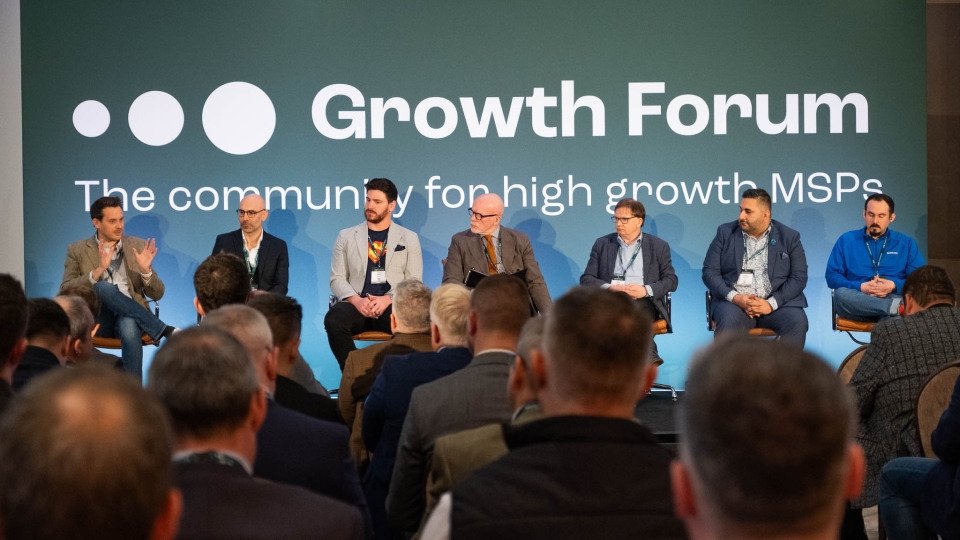At the IT Europa Growth Forum last week, experts warned that midsize MSPs risk extinction over the next decade, but also identified AI as a key opportunity for firms to innovate and thrive in today’s competitive market...

The IT channel is experiencing robust growth, with SMBs and enterprises increasingly turning to MSPs. Canalys analyst Robin Ody forecasts a promising 12% rise in managed services revenue for 2024. However, will midsize MSPs be able to capitalise on this upward trend?
During an initial panel debate at IT Europa’s Growth Forum last week, held at The Grove Hotel in Watford, Jack Cooke, Channel Development Manager for EMEA at Datto/Kaseya, painted a stark picture for the future of midsize MSPs.
“Over the next five to ten years, many midsize MSPs are likely to disappear,” he stated. “This change will stem from larger MSPs acquiring midsize ones, and the emergence of smaller, boutique businesses with a strong focus on areas like security.”
This forecast, highlighting a fiercely competitive market, was at one of the key takeaways of the panel discussion moderated by Adam Zoldan of Knight Corporate Finance. The panel included voices from Connectwise, Lenovo, Giacom, Threatlocker, and Modern Networks.
While Dale Parkinson, Managing Director, Connectivity, at Giacom, expressed optimism for the industry's growth, anticipating a reduction in “interest rates by the Bank of England” within the next year, Alex Winter, Director of Expansion Sales in EMEA at ConnectWise, echoed Cooke’s views, adding another layer to the challenge: the aging demographic of MSP owners.
"A large segment of MSP owners are in their 50s and 60s, looking to retire after years of dedication. Frequent acquisition offers find many MSPs unprepared to sell, presenting a challenge for those seeking growth or an exit strategy.
“This situation presents a challenge for those MSPs seeking acquisitive growth but uncertain about finding the right financial partner. They're not sure how to renew their business to be a platform business.”
Furthermore, the sector is likely to see consolidation alongside the entrance of new competitors to contend with, according to Jeff Taylor, Lenovo's Executive Director of Global Channel Management. He noted the increasing trend of entities similar to Lenovo, traditionally focused on hardware and transactional operations, venturing into the MSP space.
“They're entering either by establishing their own managed service practices or through acquiring existing ones. This adds a new dimension to the organic growth and acquisition landscape, as these new players are expected to be highly aggressive."
AI offers new growth avenues for MSPs
Artificial Intelligence (AI) was also a hot topic in the second panel discussion, moderated by Paul Cunningham, Owner and Director of Blue Barn Consulting. The panel, featuring guests from Kaseya, Connectwise, Lenovo, Giacom, Sophos, and Kerv, focused on emerging technology trends for managed services.
The session focused on various issues, but one standout insight was offered by Arsalan Eizadirad, the Senior Manager of Global MSP Strategy at Lenovo, who emphasised the golden opportunity of AI for MSPs.
Eizadirad highlighted that the burgeoning interest in AI across industries is a call to action for MSPs. "Everybody wants to do something around AI," he notes, underlining the growing need for AI integration in business processes.
He observes that the common perception of MSPs in relation to AI is often limited. "When it comes to MSPs and AI, many people immediately think of pouring more technical resources into creating powerful servers and engaging in extensive coding and programming," Eizadirad says.
While acknowledging the importance of these technical investments, Eizadirad urges MSPs to look beyond. He emphasises the necessity for MSPs to broaden their scope of services, especially considering the legal and regulatory aspects of AI.
"As more and more businesses ask for AI, workflows, and tools to be implemented within your business, MSPs should not only invest in technical resources. They must also delve into legal resources or data scientists to understand the complexity and also regulation that's going to be introduced around this type of service."
Kyle Torres, Senior Channel Account Executive at Sophos, concurred by stressing the importance for MSPs to be mindful of potential future regulatory pitfalls. “From a cybersecurity standpoint, the dialogue has significantly shifted in recent years towards a more risk-oriented approach. This is also becoming apparent with AI.
“It's crucial to keep an eye on the direction of regulations and frameworks, as the last thing anyone wants is to develop a new AI-based risk assessment for clients, only to discover that regulations emerging a year later that prohibit businesses from judging users using AI models. This is currently the case in Europe, where such regulations are already established and signed off. In the UK, however, we're somewhat further behind.”
However, Eizadirad notes that by embracing AI in various aspects, including legal and data science, MSPs “can offer more holistic solutions to their clients,” he says. "It's a huge opportunity for the MSPs." Supporting this, a poll during the panel showed that almost 70% of MSP leaders aim to up their R&D spend in the next 18 months, focusing on AI, automation, and cybersecurity.
Rufus Grig, Chief Technology & Strategy Officer at MSP Kerv, said: “AI is infecting everything, and in the last four months alone, so many products have been built with AI. We're hearing from a lot of partners; there's excitement about AI everywhere, and everyone wants to get involved with AI, but many are still unsure about how to proceed. Therefore, they are seeking education and guidance on how we could potentially use it.”
Jack Cooke, Channel Development Manager for EMEA at Datto/Kaseya, agreed, emphasising that AI and automation can help firm’s oversee tier-one tasks in IT management. “We can use AI to free up a little bit more of that time, within our business, particularly tier-one tasks,” he says. “It gives you that time to reinvest into your staff, into their skills, and training to try fill those gaps within your business.”
Leveraging offshore talent to scale workforce flexibility
In the third and final panel discussion, moderated by Kate Wood and featuring speakers from Kaseya, Connectwise, Lenovo, Giacom, Heimdal, and IT Glue, the focus was on organisational culture and its challenges, like recruitment and training.
A standout insight came from Alex Ford, Sales Director at IT Glue, emphasising the importance of leveraging offshore talent, particularly in the wake of challenges like COVID-19.
“With offshore support, I think it's about how you do it. Take COVID, for instance — I hate to go back to that, but it prompted a lot of MSPs to broaden their scope,” Ford says.
“They were hiring UK minorities or even people in places like The Bahamas, which was great for providing 24/7 support by paying someone a normal day rate. There are definitely opportunities there.”
This shift has not only been a response to the pandemic but also a strategic move to access a global talent pool. For Ford, countries like the Philippines are known for their significant reservoir of skilled professionals.
Ford said: "There are some really good companies with setups in places like the Philippines, where there's a ton of talent. However, it can be tricky for a UK business to work directly with them. Using offshore support can be a huge superpower in today's global market."


